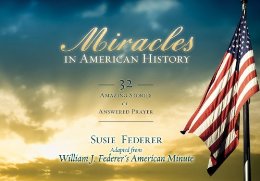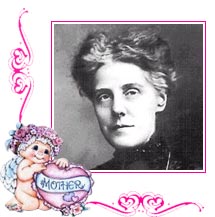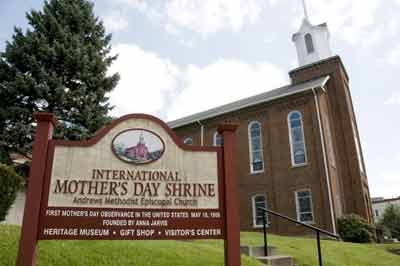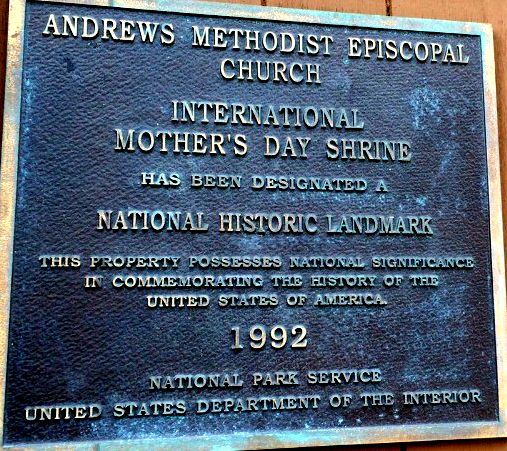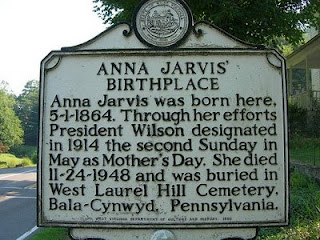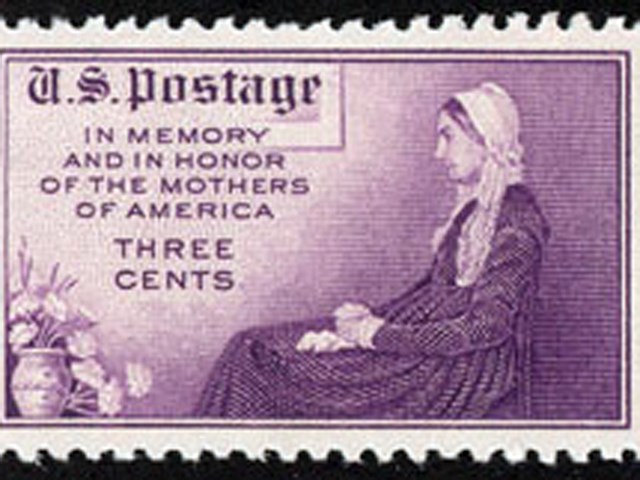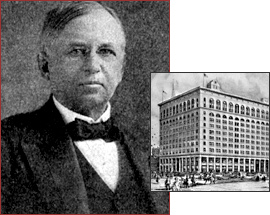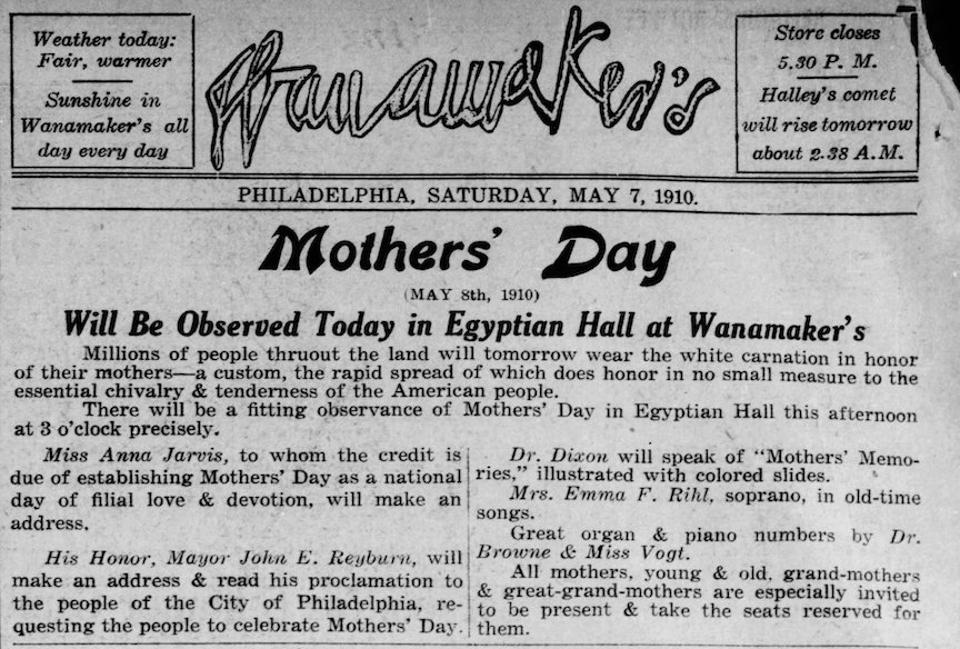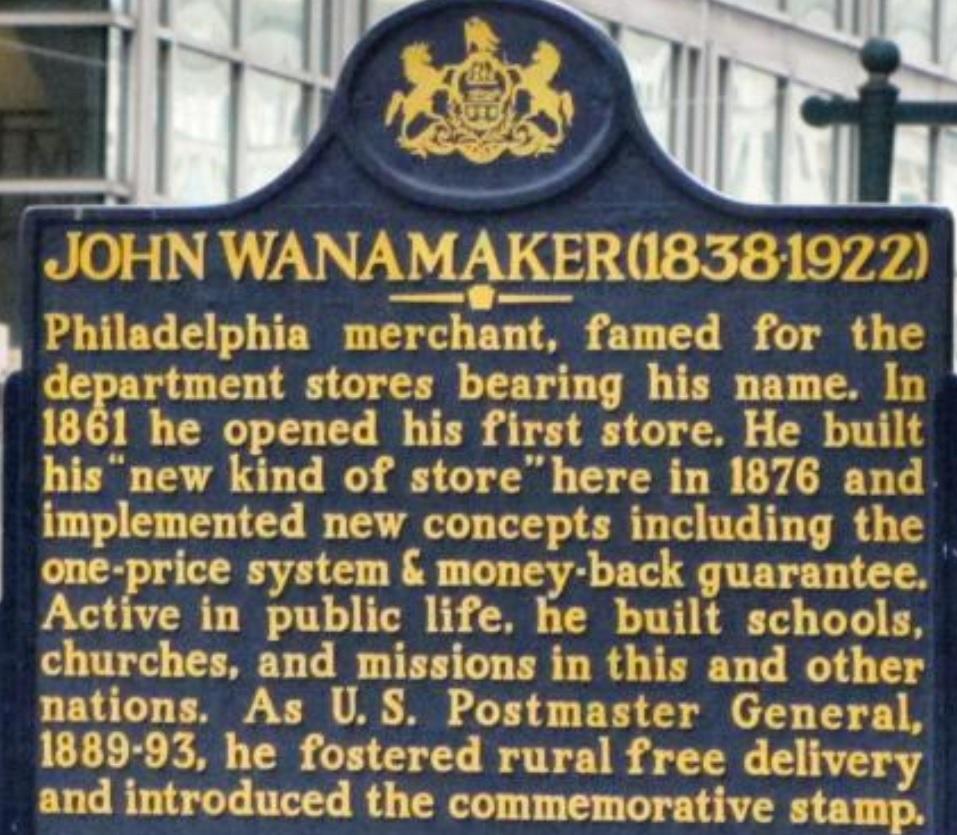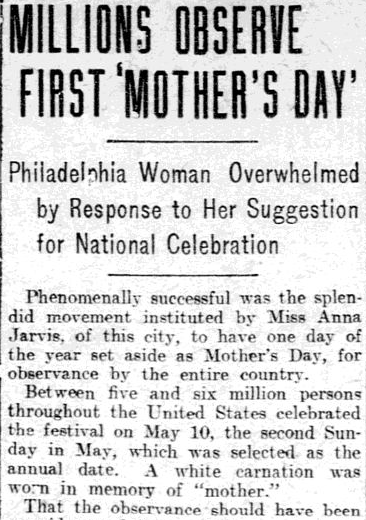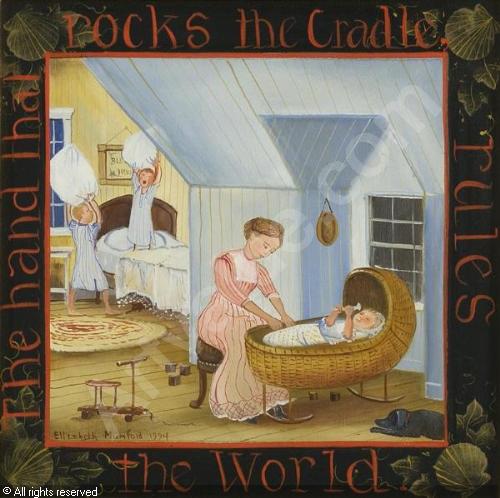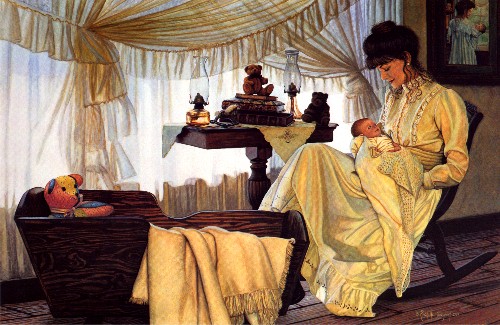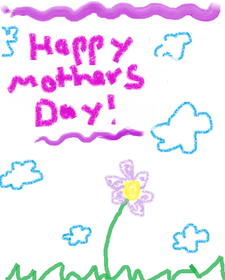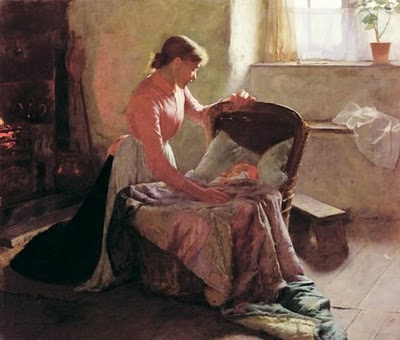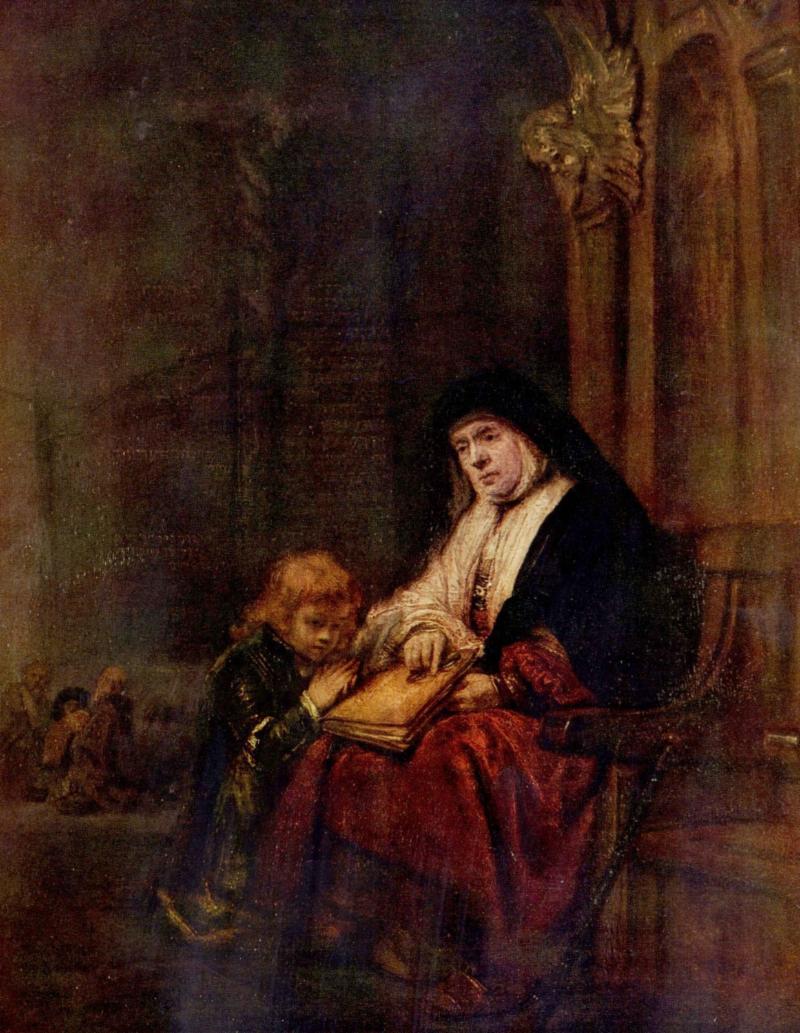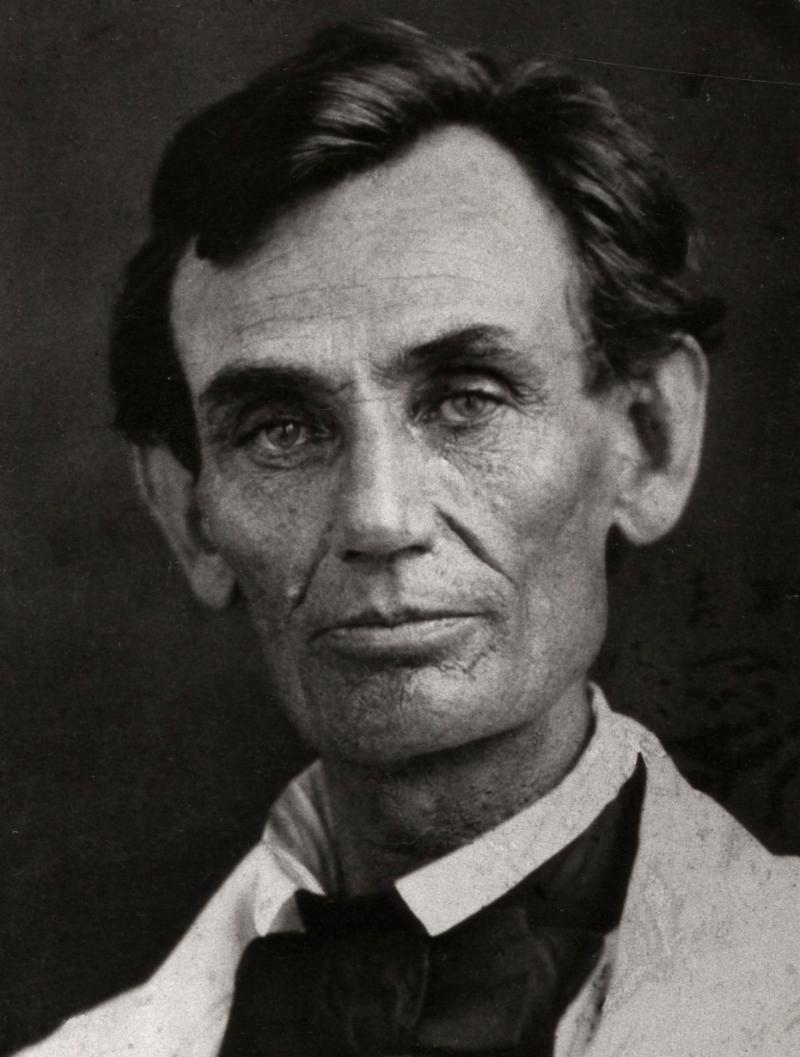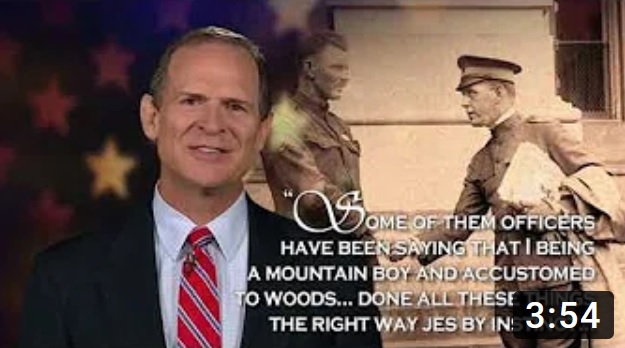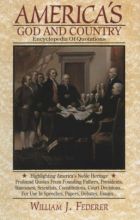A Mothers’ Day celebration was held in Boston in 1872 at the suggestion of abolitionist and suffragist Julia Ward Howe, writer of “The Battle Hymn of the Republic.”
In the following decades, numerous Mother’s Day efforts sprang up.
One was in 1904, by the administrator of the University of Notre Dame, Frank Hering, After observing students sending penny postcards to their mothers, he proposed “setting aside one day in the year as a nationwide memorial to the memories of mothers and motherhood,” writing:
“Throughout history the great men of the world have given their credit for their achievements to their mothers. The Holy Church recognizes this, as does Notre Dame.”
|
|
The person who successfully made Mother’s Day into a national event was Anna Jarvis, of Grafton, West Virginia, the granddaughter of a Baptist minister.
|
|
Anna Jarvis was a member of Andrews Methodist Episcopal Church, where she taught Sunday school.
|
|
In 1876, after one of her lessons, she closed with a prayer:
“I hope and pray that someone, sometime, will found a memorial mothers day commemorating her for the matchless service she renders to humanity in every field of life. She is entitled to it.”
|
|
Anna Jarvis’ mother, during the Civil War, had organized Mothers’ Day Work Club to care for wounded soldiers, both Union and Confederate.
|
|
Anna’ mother raised money for medicine, inspected bottled milk, improved sanitation and hired women to care for families where mothers suffered from tuberculosis, May 9, 1905.
|
|
Inspired by her mother’s self-sacrifice and generosity, Anna Jarvis wanted to honor her and all mothers.
On May 12, 1907, Anna persuaded her church, Andrews Methodist Episcopal Church, to have a small Mother’s Day service.
The church then agreed to set aside every year the 2nd Sunday in May, the anniversary of her mother’s death, as a day to show appreciation to all mothers — the makers of the home.
|
|
The next year, May 10, 1908, Anna organized a Mother’s Day two places:
Andrews Methodist Episcopal Church, where she sent a telegram;
and in Philadelphia, where she gave a moving speech in the auditorium of the 12-story Wanamaker Department Store.
|
|
John Wanamaker was a retail pioneer and founder of one the first department stores.
|
|
Wanamaker, who had paintings of Christ throughout his store, stated:
“There is a power in the Gospel of the Lord Jesus Christ. Keep uppermost the profound conviction that it is the Gospel that is to win the heart and convert the world.
The things that were sweet dreams in our childhood are now being worked out. The procession is being made longer and longer; the letters of Christ’s name are becoming larger and larger.”
|
|
With the financial backing of John Wanamaker and H.J. Heinz, maker of “57 varieties” of ketchup, Anna Jarvis began a letter-writing campaign to ministers and politicians to establish a “national” Mothers’ Day.
|
|
Due to the overwhelming support of pastors and churches, by 1909, forty-five states observed Mother’s Day.
People wore white and red Carnations on Sunday to pay tribute to their mothers.
|
|
On MAY 9, 1914, President Woodrow Wilson proclaimed the first National Mothers’ Day as a:
“public expression of … love and reverence for the mothers of our country.”
|
|
President Reagan said in his Mother’s Day Proclamation, 1986:
“A Jewish saying sums it up: ‘God could not be everywhere – so He created mothers.'”
|
|
English Poet Robert Browning wrote:
“Motherhood: All love begins and ends there.”
|
|
Mothers have the role of imparting values into children, as American poet William Ross Wallace wrote:
“The hand that rocks the cradle is the hand that rules the world.”
|
|
Dr. James Dobson addressed the National Religious Broadcasters, Feb. 16, 2002:
“If they can get control of children … they can change the whole culture in one generation.”
|
|
This was echoed by historians Will and Ariel Durant in The Lessons of History, 1968:
“Civilization is not inherited; it has to be learned and earned by each generation anew;
if the transmission should be interrupted … civilization would die, and we should be savages again.”
|
|
On February 3, 1983, at the annual National Prayer Breakfast, President Ronald Reagan stated:
“I have a very special old Bible.
And alongside a verse in the Second Book of Chronicles there are some words, handwritten, very faded by now.
And believe me, the person who wrote these words was an authority. Her name was Nelle Wilson Reagan. She was my mother.”
|
|
Reagan stated:
“Freedom is never more than one generation away from extinction.
We didn’t pass it to our children in the bloodstream.
It must be fought for, protected, and handed on for them to do the same, or one day we will spend our sunset years telling our children and our children’s children what it was once like in the United States where men were free.”
|
|
On Mother’s Day, May 8, 2020, President Donald J. Trump proclaimed:
“We celebrate the exceptional mothers in our lives …
Whether they became mothers through birth, adoption, foster care, or other means, these women are deserving of our unending gratitude and praise this day and every day.
The intuition and wisdom passed from mother to child strengthens the fabric of our Nation and preserves generations of wisdom and familial values.
In our earliest days, our mothers provide us with love and nurturing care.
They often know our talents before we do, and they selflessly encourage us to use these God-given gifts to pursue our biggest dreams …
I encourage all Americans to express their love and respect for their mothers … whether with us in person or in spirit, and to reflect on the importance of motherhood to the prosperity of our families, communities, and Nation.”
|
|
The Apostle Paul wrote to Timothy (2 Timothy 1:5):
“I have been reminded of your sincere faith, which first lived in your grandmother Lois and in your mother Eunice and, I am persuaded, now lives in you also.”
|
|
Abraham Lincoln stated:
““I remember my mother’s prayers and they have always followed me. They have clung to me all my life.”
“All that I am or ever hope to be, I owe to my angel mother.”
|
|
Schedule Bill Federer for informative interviews & captivating PowerPoint presentations: 314-502-8924 wjfederer@gmail.comAmerican Minute is a registered trademark of William J. Federer. Permission is granted to forward, reprint, or duplicate, with acknowledgment.
|
|
|
|
|
|
|
 American Minute with Bill Federer
American Minute with Bill Federer American Minute with Bill Federer
American Minute with Bill Federer


